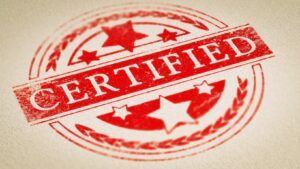Sports Nutrition Certification
- Importance of Certification: Sports nutrition certification is essential for professionals aiming to enhance athletic performance through informed dietary guidance.
- Comprehensive Knowledge: Certified individuals gain deep insights into macronutrients, micronutrients, hydration, and food timing crucial for tailored nutrition plans.
- Career Advancement: Certification opens doors for better job prospects, higher salaries, and exclusive networking opportunities within the sports and fitness industries.
- Diverse Specializations: Various certifications offer specializations like endurance sports nutrition, strength training, and youth sports nutrition, catering to unique athlete needs.
- Critical Evaluation: When selecting a certification, consider factors like accreditation, curriculum quality, specialization options, and ongoing education requirements.
- Continuous Learning: Staying updated with current research and trends through recertification is vital for maintaining a high standard of practice in sports nutrition.
In today’s competitive sports landscape, athletes and fitness enthusiasts are increasingly recognizing the importance of proper nutrition. Sports nutrition certification has emerged as a vital credential for professionals seeking to guide individuals in optimizing their dietary choices for performance and recovery. With a growing demand for knowledgeable experts, this certification equips individuals with the skills to create tailored nutrition plans that enhance athletic performance.
Whether it’s helping a marathon runner fuel for endurance or advising a bodybuilder on macronutrient ratios, certified sports nutritionists play a crucial role in achieving fitness goals. As the field continues to evolve, understanding the nuances of sports nutrition becomes essential for anyone serious about maximizing their potential in sports and fitness.
Overview of Sports Nutrition Certification
Sports nutrition certification equips professionals with the knowledge and skills to support athletes in achieving optimal performance through nutrition. Certification programs cover essential topics, including macronutrients, micronutrients, hydration, and food timing. These elements are crucial for developing effective nutrition strategies tailored to individual athletes.
Various organizations offer sports nutrition certifications, each with specific requirements. Some programs require candidates to hold relevant degrees in nutrition or dietetics, while others accept individuals with a background in exercise science or fitness. Certification may involve completing coursework, passing examinations, and gaining practical experience.
Certified sports nutrition professionals provide guidance to diverse groups, from amateur athletes to elite competitors. They assess dietary habits, identify nutritional gaps, and formulate personalized nutrition plans. By understanding an athlete’s unique needs, certified professionals can enhance performance, support recovery, and reduce the risk of injury.
Incorporating evidence-based approaches is vital in sports nutrition. Professionals must stay informed about current research to ensure their recommendations reflect the latest findings. Continuous education and recertification processes help maintain a high standard of practice in this evolving field.
Overall, sports nutrition certification represents an essential credential for those dedicated to refining athletic performance through nutrition. It fosters trust between clients and trainers, ensuring that athletes receive comprehensive support to achieve their performance goals.
Benefits of Sports Nutrition Certification
Sports nutrition certification offers valuable benefits to professionals seeking to enhance their expertise in the field of athletic nutrition. This credential supports career growth, fosters trust among clients, and ensures a comprehensive understanding of nutrition’s impact on performance.
Enhanced Knowledge and Skills
Enhanced knowledge and skills are key advantages of obtaining sports nutrition certification. Professionals gain in-depth understanding of critical topics, such as the role of macronutrients in energy production, the importance of micronutrients in recovery, and strategies for effective hydration. Certification programs also cover food timing principles, enabling professionals to create precise nutrition plans tailored to athletes’ specific needs. This thorough education empowers certified individuals to make informed dietary recommendations based on current research and evidence-based practices.
Career Advancement Opportunities
Career advancement opportunities abound for certified sports nutrition professionals. Many employers prefer certified candidates when hiring for positions in sports teams, fitness facilities, or wellness programs. Certification often leads to increased job prospects and potential for higher salaries. Additionally, certified individuals may gain access to exclusive workshops, conferences, and networking opportunities, facilitating connections with industry leaders. Such exposure enhances visibility in the field and helps professionals build their reputation as knowledgeable experts committed to athlete success.
Types of Sports Nutrition Certifications
Sports nutrition certifications come from various accredited organizations and offer several specialization options. These certifications ensure that professionals possess the necessary knowledge to support athletes effectively.
Accredited Organizations
Many organizations provide accredited sports nutrition certifications. Prominent organizations include:
- Academy of Nutrition and Dietetics (AND): Offers the Registered Dietitian Nutritionist (RDN) credential, focusing on comprehensive nutrition knowledge and practice.
- National Academy of Sports Medicine (NASM): Provides a Certified Nutrition Coach (CNC) program, emphasizing evidence-based dietary strategies for fitness professionals.
- International Society of Sports Nutrition (ISSN): Offers the Sports Nutrition Certification, designed for professionals seeking to enhance their expertise in sports-specific nutrition.
- National Association of Sports Nutrition (NASN): Provides its Certification in Sports Nutrition, which covers essential topics related to performance and recovery nutrition.
- Precision Nutrition: Offers a Level 1 Certification that focuses on behavioral change and coaching in the context of sports nutrition.
Each organization sets specific prerequisites, often requiring educational background, experience in nutrition, or prerequisites in related health fields.
Specialization Options
Various specialization options exist within sports nutrition certifications, catering to different interests and career paths. Specific specializations include:
- Endurance Sports Nutrition: Focusing on nutrition strategies for endurance athletes like marathon runners and triathletes.
- Strength Training Nutrition: Tailored for professionals working with bodybuilders and weightlifters, emphasizing protein intake and nutrient timing.
- Youth Sports Nutrition: Concentrating on the unique nutritional needs of young athletes for optimal development and performance.
- Clinical Sports Nutrition: Combining sports nutrition expertise with clinical knowledge to address athletes with medical conditions or special dietary requirements.
- Holistic Nutrition: Emphasizing overall well-being and considering the psychological and emotional aspects of nutrition alongside physical performance.
These specializations allow certified professionals to target specific populations and enhance their effectiveness in supporting diverse athletic needs.
How to Choose the Right Certification
Selecting the appropriate sports nutrition certification requires careful consideration of several factors. Evaluating these elements ensures the chosen program aligns with professional goals and meets the needs of potential clients.
Factors to Consider
- Accreditation: Verify that the organization offering the certification is accredited and recognized in the industry.
- Curriculum: Examine the curriculum to ensure it covers essential topics such as macronutrients, micronutrients, and dietary strategies tailored for athletes.
- Reputation: Research the reputation of the certification program among professionals in the field. Testimonials and reviews provide insight into the program’s credibility.

- Specialization: Identify whether the certification offers specializations that match personal interests or target specific populations, such as youth athletes or endurance sports enthusiasts.
- Recertification Requirements: Review the recertification process and requirements to maintain the credential, ensuring ongoing education opportunities are included.
- Tuition Fees: Compare the tuition fees of various certification programs, as costs can vary significantly.
- Duration: Assess the program duration, with options ranging from a few months to over a year, depending on the certification level and depth of content.
- Study Materials: Determine if the program includes study materials or resources, which can influence both cost and time commitment.
- Flexible Learning Options: Explore whether the program offers online courses or in-person classes, accommodating different learning styles and schedules.
- Examination Fees: Factor in potential examination fees, which can add to the overall investment in obtaining the certification.
Vital Asset for Professionals
Sports nutrition certification stands as a vital asset for professionals dedicated to optimizing athletic performance through tailored dietary strategies. By acquiring this credential, individuals not only enhance their knowledge but also gain credibility in a competitive field. The ability to create personalized nutrition plans empowers certified professionals to effectively support athletes across various disciplines.
As the demand for knowledgeable nutritionists continues to grow, pursuing certification opens doors to diverse career opportunities. Staying updated with the latest research and trends ensures that certified experts provide the best guidance possible. Ultimately, investing in sports nutrition certification is a strategic move for those committed to helping athletes reach their full potential.

